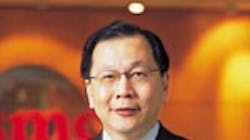Executives at Taiwan Semiconductor Manufacturing Ltd. didn't sit tight and hope the economy would improve enough to lift sales in the semiconductor market. The US$10 billion custom chip maker entered the solar technology industry in December when it acquired 20% of Motech Industries Inc. for US$193 million.
The company also has plans to enter the LED lighting market. IndustryWeek spoke with Rick Tsai, the company's president of new businesses and former president and CEO, for its "The Case for Product Reinvention" story about companies entering entirely new industries. Below is a partial transcript of IW's interview with Tsai in early December.
IW: Seeing as the company's knowledge is in semiconductors, what was the reasoning behind the decision to enter the solar market?
Tsai: The decision to enter the solar market, as well as the field of "green energy" in general, was due to a combination of factors: First, we have observed that the semiconductor market is maturing. Since 2000, the compound annual growth rate of the semiconductor market has declined to single digits. While we still expect our sector, dedicated chip foundry, to continue to outperform the overall semiconductor industry, we believe that we can bring more value to shareholders by finding new ways to drive growth beyond the next decade.
Second, we believe that demand for a greener world is a long-term trend. While it may impose some costs in the form of carbon taxes or quotas, at the same time it can also create new business opportunities. Finally, we sincerely believe that it is part of our corporate social responsibility to directly contribute to a greener world. We believe we can do well and do good at the same time. While this may sound like an empty slogan, I would like to point out that some members of the analyst community have questioned why we are entering a business with lower gross profit margins while our core dedicated foundry business makes 40-50% gross profit margins. We are confident that through innovation we can find a way to earn better than the solar industry average, but at the same time the desire to contribute to a green world is definitely part of the reason we are doing this.
Rick Tsai, president of new businesses and former president and CEO, Taiwan Semiconductor
Tsai: Speaking technically, one method for making solar panels uses polysilicon wafers, much like the semiconductor industry -- this is the technology our new strategic partner Motech uses, and we believe we will have many opportunities to learn from each other. In addition to our strategic partnership with Motech, TSMC will focus on developing our own differentiated technology in the solar supply chain, such as thin-film solar cells -- another method for making solar panels.
IW: What about the LED lighting industry. It was previously reported the company had interest in this field also. Can you please update me on this and whether there has been any progress in this area?
Tsai: At this point we can only disclose that the board of directors has authorized US$46 million for setting up an LED production line and product development lab. We are not ready to disclose more details about this facility or other moves in the LED area right now.
IW: What types of challenges will the company have to address by entering an entirely new industry?
Tsai: The LED and solar industries are very different from our core semiconductor foundry business, and we are still working on the best strategy for us in these industries. Indeed, part of the reason we entered into a strategic partnership with Motech was to gain a better understanding of the solar supply chain. Our task right now is to find the entry points in the value chain, define the right business models and formulate the business strategies. While we are not completely done with these, they are certainly taking shape very quickly.
See Also
About the Author
Jonathan Katz
Former Managing Editor
Former Managing Editor Jon Katz covered leadership and strategy, tackling subjects such as lean manufacturing leadership, strategy development and deployment, corporate culture, corporate social responsibility, and growth strategies. As well, he provided news and analysis of successful companies in the chemical and energy industries, including oil and gas, renewable and alternative.
Jon worked as an intern for IndustryWeek before serving as a reporter for The Morning Journal and then as an associate editor for Penton Media’s Supply Chain Technology News.
Jon received his bachelor’s degree in Journalism from Kent State University and is a die-hard Cleveland sports fan.
